![]()
The current golden age of tabletop gaming has also led to a similar surge in apps that adapt board games to tablets and phones, with new ones arriving almost every week — and some games even premiering in digital form at the same time they show up on store shelves. I’ve tried more than 50 such apps, all of which are based on games you can buy in stores, and here are my top 25. Unless otherwise noted, these are all available on iOS and Android, with some on Steam, as well. The list does not include apps, such as Samurai and Through the Desert, that stopped working in the June 2017 “app-ocalypse,” when Apple required developers to update their apps for 64-bit support, or apps like Battle Line that still work but are no longer available for purchase.
With new game apps coming all the time, we’ll update this list regularly to reflect any new titles that merit inclusion. Asmodee Digital has already announced ports of Scythe and Terraforming Mars for this year, as well as one for The Lord of the Rings: The Card Game from their Fantasy Flight Games division; Digidiced has an Isle of Skye app in production; Acram Digital is working on Istanbul; and North Star Games will bring its game Evolution out this spring.
25. Friday (Brettspielwelt)
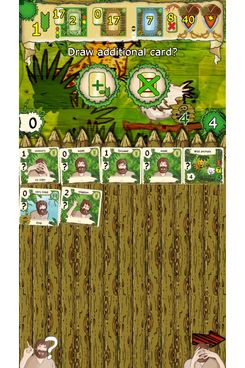
Friday is a solo board game that turns you into Robinson Crusoe, asking you to work through your deck of cards, each of which has two halves, one that gives you an ability, the other showing a “hazard” you must fight to gain that card. Each hazard card shows the number of cards you can draw to fight it; drawing more than that costs you one life point per card. Part of the challenge involves trashing cards that won’t help you from your deck so that you don’t waste your draws on useless cards and drain your life points. The game gets harder each time you turn over the deck, and then you must fight two bigger challenges at game-end to win. It’s maddeningly addictive, and you can amp up the difficulty by starting with fewer life points and incorporating strongly negative ability cards like the “very stupid” option. The tutorial is very helpful, especially if you haven’t played deck-builder games before.
24. Lords of Waterdeep (Playdek)
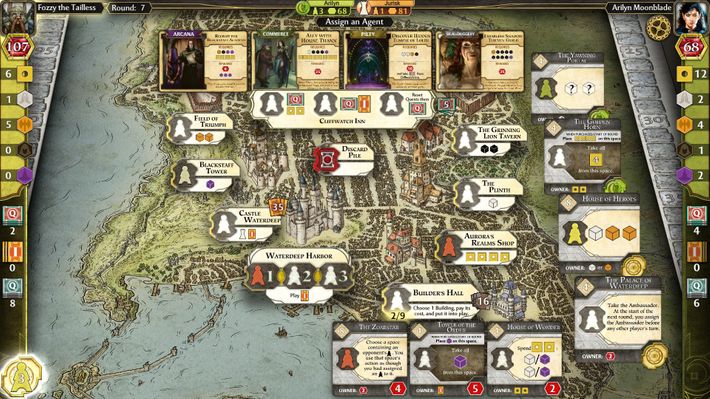
Don’t let the D&D theme mislead you — Lords of Waterdeep is a true board game, not a role-playing game, one that revolves around worker placement and collecting cubes to fulfill requirements on quest cards for points. Those cubes represent fighters, rogues, wizards, and clerics, which you need in specific combinations, sometimes adding gold, to complete and score quest cards. You can also buy and add buildings to the board or play Intrigue cards that give you benefits, often at opponents’ expense, or even play a Mandatory Quest card that an opponent must complete before doing anything else. The app’s tutorial is extremely well done, breaking the rules into five easy steps; what I don’t love is how the app asks you to drag a card to the center to play or complete it, which isn’t very intuitive. The Undermountain and Skullport expansions are available as in-app purchases.
23. Tigris & Euphrates (Codito)
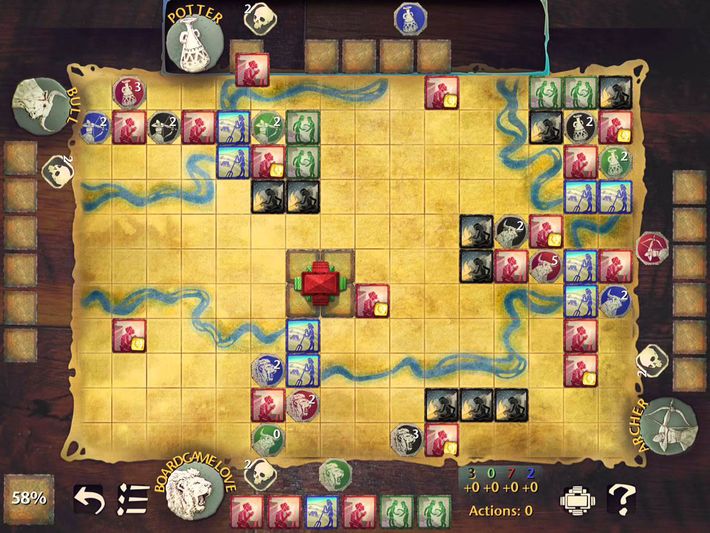
A game by design luminary Reiner Knizia — who’s perfect for digital adaptations, since his games tend to have math-based mechanics — this pits two to four players against each other for control of building tiles on a board … but the catch is that you gain points in the four different building colors, and then you’re judged on the lowest of those four scores. The player with the best low score wins. It’s one of Knizia’s mathiest games underneath, but plays out as one of his most interactive because the mechanics allow players to seize control of huge portions of the board, even well into the game.
22. Lost Cities (Coding Monkeys)
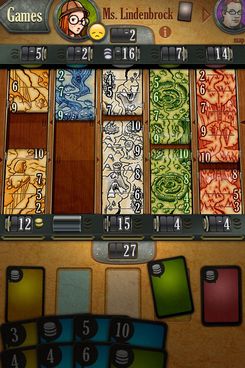
More Knizia. A two-player title this time, with competitors playing cards from five “expeditions” and trying to place those cards in numerical order — once you’ve played a card, you can’t pick it up or play a card of the same color with a smaller number. You score points if an expedition’s total exceeds 20, lose points if it’s less, and can play multipliers to double, triple, or quadruple your score, for better or for worse. The AI players are competent but could be better. This is only available on iOS.
21. San Juan (Ravensburger Digital)
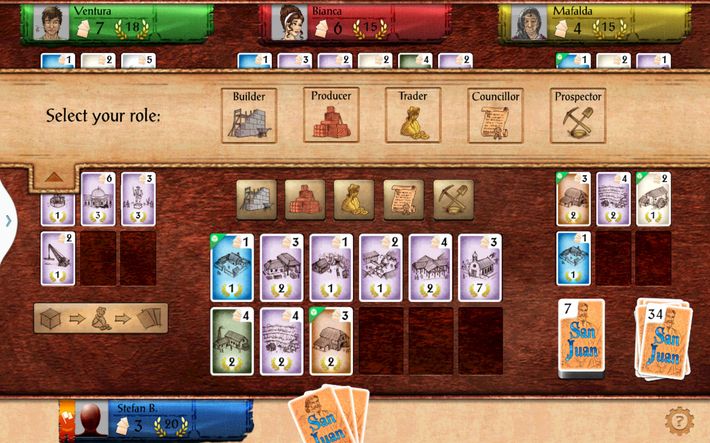
The card-game version of Puerto Rico, which is further down on the list, San Juan takes the same theme, but with simpler mechanics, while introducing the randomness of card draws. You play cards that represent buildings to earn points and to allow you to do more things on each turn, discarding cards as payment for things you build. The app looks great and it’s easy to follow players’ moves, although the lack of an undo function holds it back.
20. Brass (Cublo)
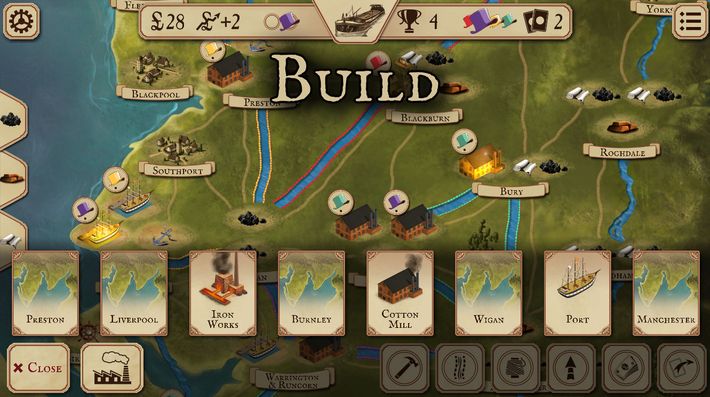
A beautiful rendition of one of designer Martin Wallace’s famed economic games, most of which also involve trains because he really likes trains (and who doesn’t?), Brass is set in the industrial-revolution era in England and asks players to build factories so that they can manufacture and ship cotton, iron, and coal for points — but you have to borrow enough to keep your business going so that eventually you can turn a profit. The original version didn’t have a strong enough AI component, but the developers added a harder option last year.
19. Coup (Banana & Co.)
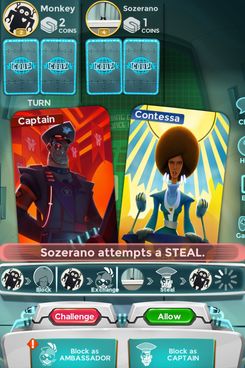
The only game on the list that you can’t play solo, Coup is a competitive deduction and bluffing game where each person has two cards with roles on them, and the goal is to be the only player left with at least one hidden card. The five roles let you do things like take money or assassinate another player’s card by guessing his or her role … but you don’t have to show your card to play it, so you can lie and hope no one challenges you. Free for iOS and Android.
18. Puerto Rico (Codito)
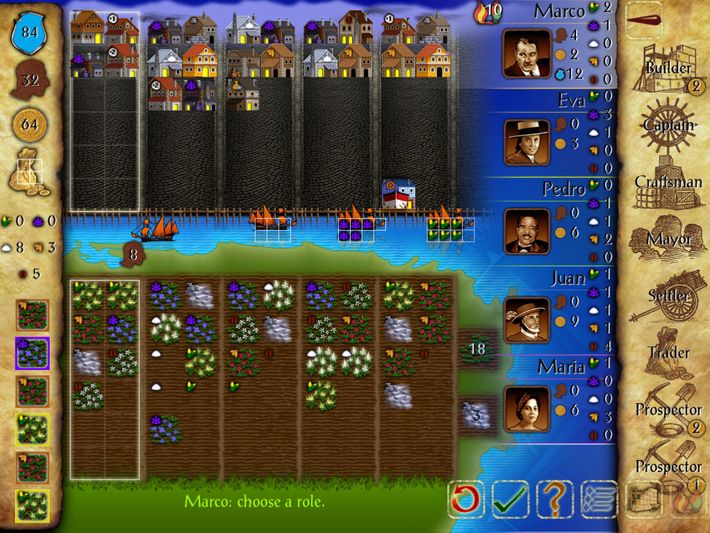
One of the all-time great Euro games, Puerto Rico is a high-strategy game with very little randomness or luck involved. You’re building out a colony by planting crops, constructing buildings, shipping goods either for money or points, and hiring colonists represented by … (squinting) little brown tokens. (That’s true in the physical game as well.) It’s a classic “engine builder,” where you set things up in your space to generate stuff each round, mostly trade goods you can ship for points, which is the optimal strategy unless everyone else is doing it, too. Only available on iOS.
17. Steam (Acram)
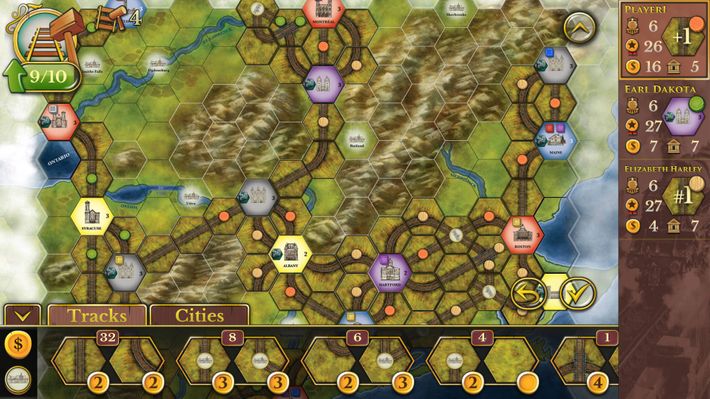
Another Wallace title, this one a little easier to understand than Brass but not as appealing to look at. Steam has players competing to build rail lines on any of various maps — one standard map is New England — to connect cities and towns and then ship various colored cubes across their rail lines. You get money each time a good travels along one of your tracks, regardless of who’s shipping it. There’s almost no randomness or luck involved here, making this a great game if you enjoyed that operations-research class you took in business school.
16. Tokaido (Funforge)
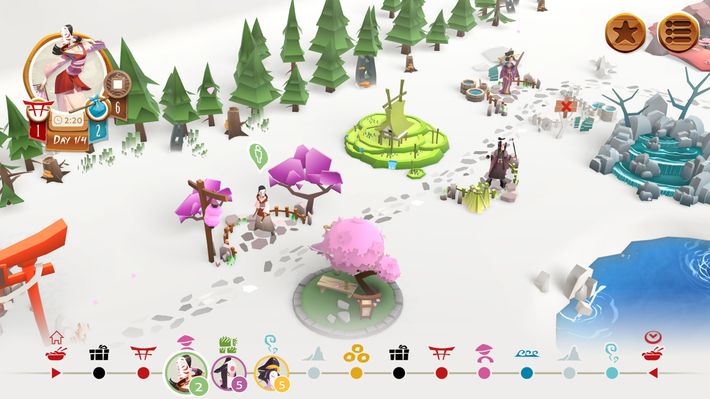
Designer Antoine Bauza loves Japanese themes in his games, with gorgeous artwork to match, with the app version of Tokaido bringing the same graphics, while adding some cute animations to make the board feel less static. The real Tōkaidō, or East Sea Road, was a major thoroughfare in Japan during the Edo period, traveled by foot and connecting Kyoto to what is now Tokyo. Players in Tokaido travel along the board, stopping wherever they wish, with each stop allowing them to do something that eventually leads to points — collecting artifacts, donating to the temple, collecting portions of artworks, or buying meals at the inns along the route. Although there are several different ways to rack up points, usually you just want to stop everywhere you can, both to gain the benefits and because you can block another player from stopping there.
15. Patchwork (Digidiced)
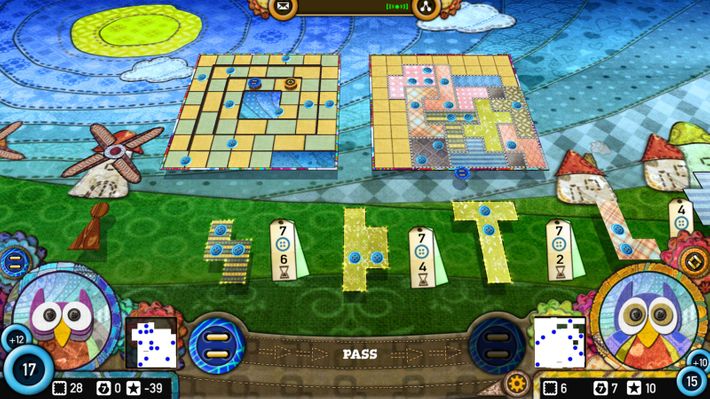
A clever two-player game from Uwe Rosenberg, usually known for heavier games that involve gathering wood and raising farm animals and take two hours just to set up, Patchwork is a bit like competitive Tetris. Players take oddly shaped fabrics from a rondel that limits choices on each turn, placing them on their nine-by-nine boards and sometimes gaining buttons, the game’s currency, to allow them to buy bigger fabric pieces or gain more choices from the board. The graphics in the app don’t correspond to the physical game’s imagery, though, and are frankly a little too cutesy.
14. Eight-Minute Empire (Acram)
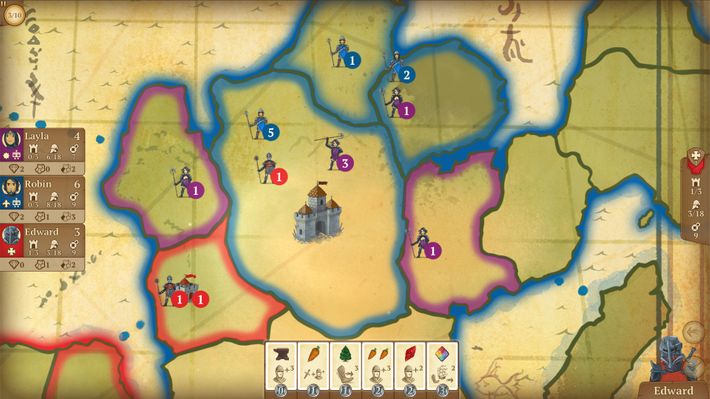
It’s like the title says: This is a map game of area control and takes just a few minutes to play. Everyone starts in the same space on the board with three-foot soldiers and gains a certain number of moves each turn by taking a card that grants goods as well as either movement points, military units, or the right to build a city. Scoring at the end is based on control of continents and collections of goods, with the biggest bonuses coming if you collect a lot of any one good. It’s fast and the AI players are good. The developers, Acram, just announced that their next app will be Istanbul, among my family’s favorites on tabletop.
13. Lanterns: The Harvest Festival (Dire Wolf Digital)

Another game with beautiful artwork and animations, Lanterns is a tile-placement game with a clever scoring twist: Every time you place a square lantern tile, you gain a token of the color facing you … and each opponent gets a token of the color facing him or her. You gain a second token if you matched the edge of the tile you placed to the edge it’s touching on the board. You trade in tokens in sets for points, but the point bonuses for these — one of each of the seven colors, four of a kind, or three pair — decrease over the course of the game. It’s over quick, and since you can’t control your tile draws, your strategy is really turn by turn.
12. Galaxy Trucker (Czech Games)
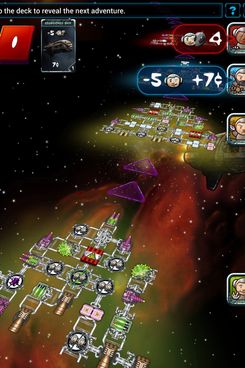
The tabletop game on which this is based involves a mad scramble for parts to trick out your spaceships, a process well-replicated, even when playing against AI players who, in theory, could just cheat and take all the good bits. What truly separates Galaxy Trucker from so many other adaptations is the best narrative campaign on any board-game app. This wasn’t just thrown together — someone wrote it like a short graphic novel you’ll play your way through many, many games over. It’s brilliant and makes the game so much more addictive.
11. Jaipur (Asmodee Digital)
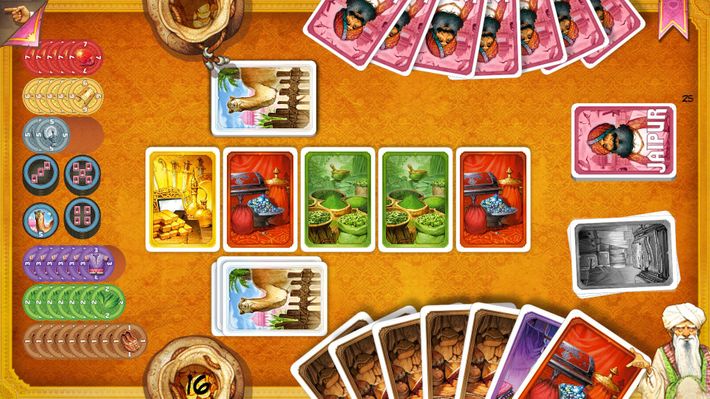
My all-time favorite two-player game got a digital version last year with an unexpected twist: a campaign mode that comprises all kinds of variants to the base game’s rules. In Jaipur, each player has a hand of up to seven cards and tries to collect sets of the six goods shown on the cards, each of which has its own value. You can only take cards from the five shown in the “market” on the table. There are also camel cards, which you can use to take multiple cards at once; a popular tactic is to set up a move where you replace all of the goods cards with camels from your stack, so that your opponent has no choice but to take all five camel cards and give you a chance to choose from five fresh cards from the deck. The campaign mode tweaks various rules, like reducing the hand size to five or changing the card values so that they’re all the same.
10. Splendor (Asmodee Digital)
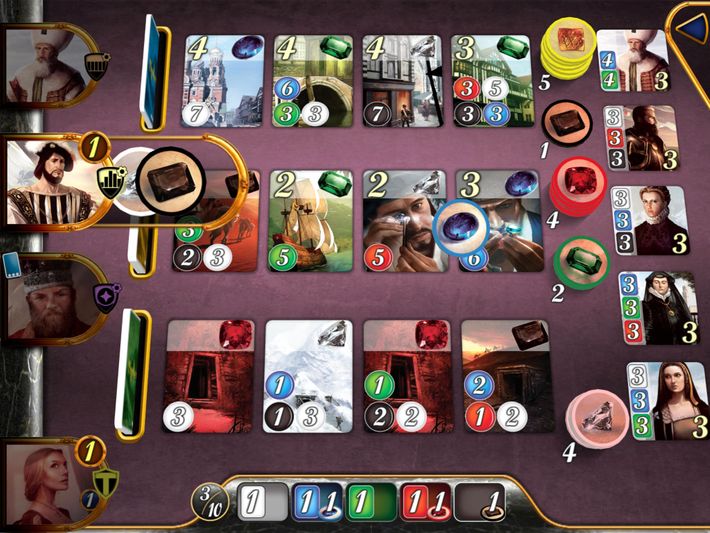
The popular, quick-to-learn game Splendor was an instant hit on its release in 2014, and the app version followed soon afterward, finally gaining online play as an option last year. Splendor players collect tokens they can use to buy any of the 12 gem cards on the table, arranged in three rows from cheapest to most expensive. The more costly a card, the more points it’s likely to be worth. Collecting certain combinations of cards — three each of three specific colors, for example — may get you a Noble tile, worth another three points. The first player to 15 points triggers the last round, and then whoever has the most points wins.
9. Pandemic (Asmodee Digital)
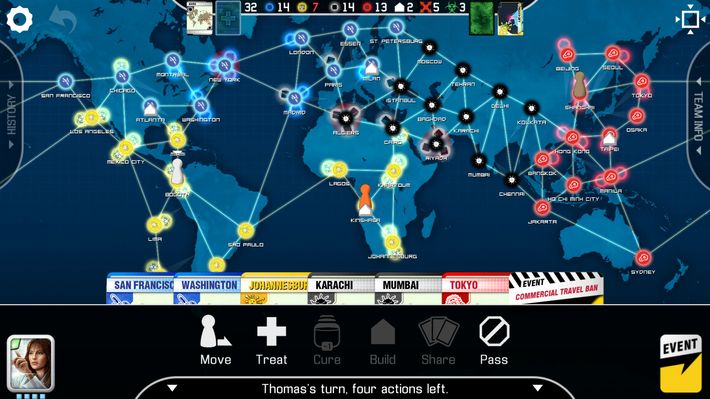
Pandemic is a cooperative game, so playing it on mobile means pass-and-play or playing it solo and handling all the roles yourself. There are four diseases spreading around the world and you have to find cures while slowing their progress across the map. If eight outbreaks occur, or you run out of cards in the player deck, you lose; if you cure all four before that, you win. You can customize the difficulty level as you’d like, including Heroic and Legendary modes if you enjoy losing. The On the Brink expansion is available as an in-app purchase, adding new player roles and event cards, plus a new challenge. There are also app versions of two similar games from the same designer, Forbidden Island and Forbidden Desert; the latter is especially good as a solo endeavor that remains difficult, but moves faster than Pandemic.
8. Caylus (Big Daddy’s Creations)

This moderately heavy-strategy game has some of the most appealing graphics — and has since day one, taking advantage of brighter colors to make the game easier to stare at for the 10 to 15 minutes it might take to finish. It’s a worker-placement game where you position your meeples on certain buildings to grab resources — seriously, gathering wood is an important skill in the tabletop-gaming world — or build new buildings so that you’ll make some coin every time another player uses them. Eventually, you’ll try to help build the king’s castle or build monuments for larger point bonuses. There’s a lot of interaction involved in placing workers, and you can even pay a little bit to move the provost marker to make certain valuable buildings off-limits for a turn. For a game that is heavy on the strategy side, it’s surprisingly light to play on the app, and the animations make it easy to follow your opponents’ moves. Only available on iOS.
7. Agricola (Playdek/Asmodee Digital)

One of the most successful worker-placement games in history and the reason we have since been inundated with games that pretend that farming is fun and easy, Agricola is really about feeding your family: You grow crops, raise animals, bake bread, build out your house, and maybe learn an occupation or two. It’s actually more enjoyable than it sounds because it’s a sort of puzzle of how to balance gaining points with the requirement that every few turns you turn in enough food to feed your family members. The huge decks of cards with occupations and additions called minor improvements gives the game replay value as well. Le Havre, a heavier game that combines elements of Agricolaand Caylus, also has an app version from Codito.
6. Race for the Galaxy (Temple Gates Games)
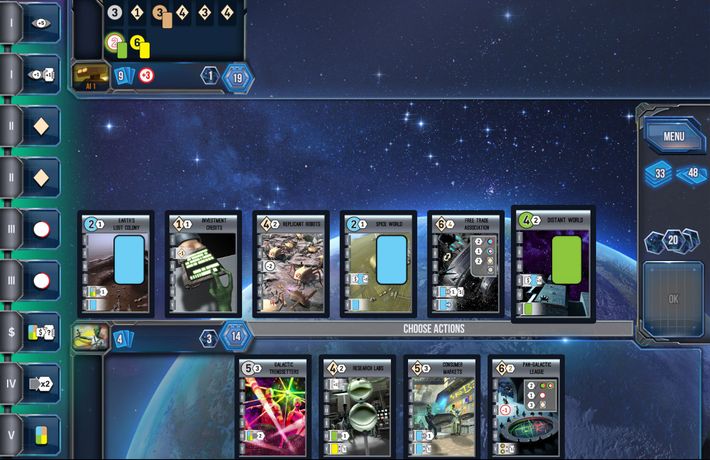
I don’t love the Race for the Galaxy board game because I think the produce or consume x2 strategy is dominant (if you don’t know what that means, don’t worry), but man is this app version a thing to behold. Not only are the AI players good but the developers managed to cram a lot of information onto even the smaller screens of phones, allowing you to zoom in on any card easily enough to read the icons, making opponents’ actions clear, and giving you plenty of chances to undo certain moves if you screw up. On a tablet, it’s just about perfect. And I can confirm that I have beaten AI players using a different strategy by going full military … but it wasn’t easy.
5. Through the Ages (Czech Games)
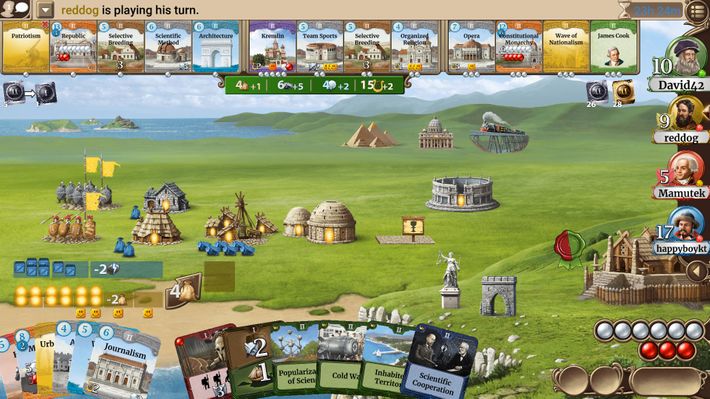
Here’s a game I haven’t played on tabletop because it’s so long and fairly heavy, but the app is stunning, featuring by far the best tutorial I’ve seen. It even has a legitimately funny joke buried within it. Through the Ages is a 4X (explore, expand, exploit, exterminate) style game played out with cards, where you try to build a civilization, complete wonders for points, beat opponents with your military, improve your government, and ensure that your workers don’t riot. There is a lot going on in this game, and too much accounting for my tastes, but the app takes care of that stuff for you, so you can focus just on playing the game itself. It also has built-in warnings if your workers are going to riot or you’re going to lose resources before the next turn. The false 3-D perspective also helps them cram a lot of buildings onto your screen without crowding it. Games against AI players take 20-plus minutes, more than anything else on this list, but there’s very little downtime involved.
4. Small World (Asmodee Digital)
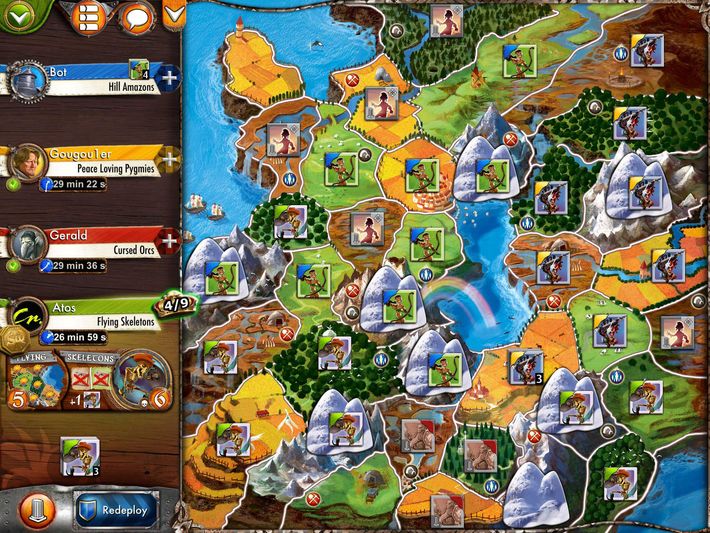
Days of Wonder, which is now part of the Asmodee family, put out two of the earliest successful board-game apps with Small World and Ticket to Ride. Both feature outstanding graphics, easy-to-follow play on tablets or phones, and competent AI opponents. They also worked particularly well for pass-and-play, with Small World — later updated and dubbed Small World 2 — including a feature that allows two players to face each other across a table and play on a tablet without having to exchange or rotate it. Small World is an area control map where there just isn’t enough room on the map for all of the players. You pick a race, grab some territories, and then put your race into “decline,” so you can pick a brand-new race and start all over again. It’s bloody good fun for the whole family — and the app takes care of the one small hassle of the physical game, tallying up points each turn.
3. Ticket to Ride (Asmodee Digital)
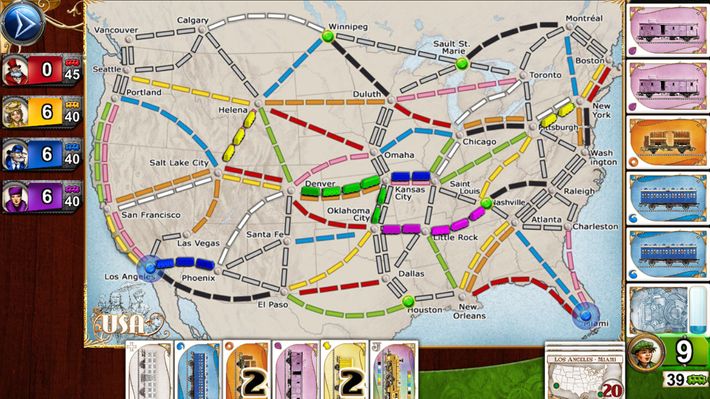
This was the original model for how to build a great board-game app, complete with an active player community, and it remains one of the best, thanks to an overhaul a few years ago and regular releases of expansions. The base game is my go-to recommendation for readers who ask for a game that they can play with their kids because the rules are simple, the scoring is easy to understand, and QED train games are awesome. The app’s tutorial is good, the animations and graphics are excellent, and the user interface is intuitive. (You’d be surprised how often board-game apps screw that last part up.) The Ticket to Ride app offers Europe, Switzerland, Nordic countries, England, Germany, Asia, India, and Pennsylvania maps as expansion options, as well as new card sets like the 1910 and 1912 sets for the U.S. There’s also a version for younger players, Ticket to Ride First Journey, as a separate app, which is also quite good.
2. 7 Wonders (Repos Production/Outer Zone Entertainment)
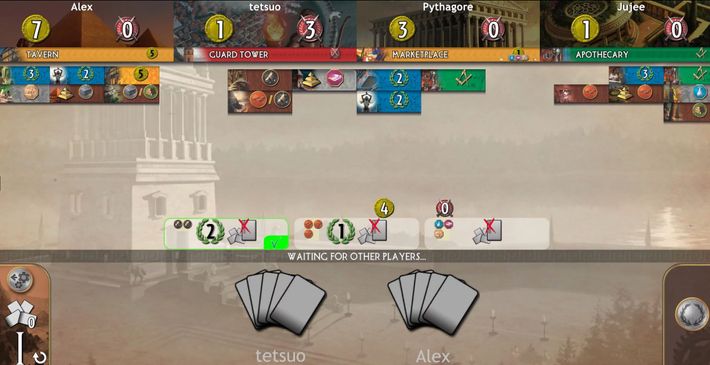
The 7 Wonders app appeared in November after years of anticipation, delays, and testing … and it was worth the wait. 7 Wonders itself is one of the best board games we’ve seen because it condenses the city-building theme into a consistent 30-minute playing time. Each player gets a hand of seven cards per round, plays one, and then passes the remaining cards to the next player, who selects one from his or her hand and passes the remainder around … so that everyone plays six cards per round (discarding one), but the cards you get to choose from keep changing as the hands move around the table. You do this three times, playing 18 cards, building a little engine that gives you the resources and coins you’ll need to play more buildings or complete your Wonder. There are lots of ways to score, so part of the game is finding a path to points that your opponents aren’t following. Moves are simultaneous, so solo games fly by on the app, although it can be tough to follow what all opponents are doing, AI or real, if you’re playing against more than three other players. The developer just added the Leaders expansion as a $1.99 in-app purchase. It’s a tremendous game that finally got the app it deserved.
1. Carcassonne (Coding Monkeys on iOS, Asmodee Digital on Android/Steam)

Carcassonne is my all-time favorite board game because it’s quick to learn, has little downtime between turns, has just a bit of luck, and yet still offers plenty of room for strategic thinking. It’s a puzzle that also involves a lot of interaction with your opponents, and it’s different every time out.
The iOS port of Carcassonne (pictured above), which goes back at least to late 2010, is the granddaddy of all board-game ports, bringing excellent graphics, a wide range of AI options (including the “evil” option, both difficult and spiteful), clear scoring, good music, and an extensive set of solo challenges. Want expansions? They’ve got ‘em: the Abbot, the Princess & Dragon, Winter, the Phantom, Traders & Builders, Inns & Cathedrals, the River 1 and 2, and German Cathedrals are all available as in-app purchases on iOS. Although it’s one of the most expensive board-game apps at $9.99, that’s a bargain given how good the app is and how much replay value it offers.

The Android port always lagged behind the iOS version, but late in 2017, Asmodee Digital, which had just acquired the license to the game, released a new version of Carcassonne for both Android and Steam, and it’s excellent (pictured above). The look and feel is very different from the top-down iOS version, offering an isometric view instead that gives the tiles some texture, although you can switch to top-down if you prefer that. The iOS app is cleaner to look at, while the Asmodee version offers more animations to give it more of the feel of a video game. There are three AI opponents, an easy one, a hard one, and a “risk-taker.” So far, the Asmodee version offers the Abbot and River expansions as in-app purchases.






